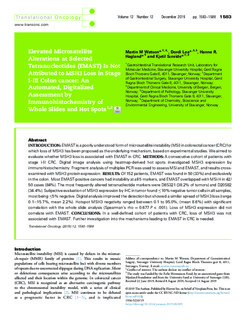| dc.contributor.author | Watson, Martin | |
| dc.contributor.author | Lea, Dordi | |
| dc.contributor.author | Hagland, Hanne Røland | |
| dc.contributor.author | Søreide, Kjetil | |
| dc.date.accessioned | 2020-02-17T13:43:26Z | |
| dc.date.available | 2020-02-17T13:43:26Z | |
| dc.date.created | 2019-11-18T14:44:47Z | |
| dc.date.issued | 2019-12 | |
| dc.identifier.citation | Watson, M., Lea, D., Hagland, H.R. et al. (2019) Elevated microsatellite alterations at selected tetranucleotides (EMAST) is not attributed to MSH3 loss in stage I-III colon cancer: An automated, digitalized assessment by immunohistochemistry of whole slides and hot spots. Translational Oncology, 12(12), pp. 1583-1588. | nb_NO |
| dc.identifier.issn | 1944-7124 | |
| dc.identifier.uri | http://hdl.handle.net/11250/2642037 | |
| dc.description.abstract | INTRODUCTION: EMAST is a poorly understood form of microsatellite instability (MSI) in colorectal cancer (CRC) for which loss of MSH3 has been proposed as the underlying mechanism, based on experimental studies. We aimed to evaluate whether MSH3 loss is associated with EMAST in CRC. METHODS: A consecutive cohort of patients with stage I-III CRC. Digital image analysis using heatmap-derived hot spots investigated MSH3 expression by immunohistochemistry. Fragment analysis of multiplex PCR was used to assess MSI and EMAST, and results cross-examined with MSH3 protein expression. RESULTS: Of 152 patients, EMAST was found in 50 (33%) and exclusively in the colon. Most EMAST-positive cancers had instability at all 5 markers, and EMAST overlapped with MSI-H in 42/50 cases (84%). The most frequently altered tetranucleotide markers were D8S321 (38.2% of tumors) and D20S82 (34.4%). Subjective evaluation of MSH3 expression by IHC in tumor found ≤10% negative tumor cells in all samples, most being ≤5% negative. Digital analysis improved the detection but showed a similar spread of MSH3 loss (range 0.1–15.7%, mean 2.2%). Hotspot MSH3 negativity ranged between 0.1 to 95.0%, (mean 8.6%) with significant correlation with the whole slide analysis (Spearman's rho = 0.677 P < .001). Loss of MSH3 expression did not correlate with EMAST. CONCLUSIONS: In a well-defined cohort of patients with CRC, loss of MSH3 was not associated with EMAST. Further investigation into the mechanisms leading to EMAST in CRC is needed. | nb_NO |
| dc.language.iso | eng | nb_NO |
| dc.publisher | Elsevier Ltd. | nb_NO |
| dc.rights | Attribution-NonCommercial-NoDerivatives 4.0 Internasjonal | * |
| dc.rights.uri | http://creativecommons.org/licenses/by-nc-nd/4.0/deed.no | * |
| dc.subject | onkologi | nb_NO |
| dc.subject | kolorektal kreft | nb_NO |
| dc.title | Elevated microsatellite alterations at selected tetranucleotides (EMAST) is not attributed to MSH3 loss in stage I-III colon cancer: An automated, digitalized assessment by immunohistochemistry of whole slides and hot spots | nb_NO |
| dc.type | Journal article | nb_NO |
| dc.type | Peer reviewed | nb_NO |
| dc.description.version | publishedVersion | nb_NO |
| dc.rights.holder | © 2019 The Authors | nb_NO |
| dc.subject.nsi | VDP::Medical disciplines: 700::Clinical medical disciplines: 750::Oncology: 762 | nb_NO |
| dc.source.pagenumber | 1583-1588 | nb_NO |
| dc.source.volume | 12 | nb_NO |
| dc.source.journal | Translational Oncology | nb_NO |
| dc.source.issue | 12 | nb_NO |
| dc.identifier.doi | 10.1016/j.tranon.2019.08.009 | |
| dc.identifier.cristin | 1748933 | |
| cristin.unitcode | 217,8,10,0 | |
| cristin.unitname | Institutt for kjemi, biovitenskap og miljøteknologi | |
| cristin.ispublished | true | |
| cristin.fulltext | original | |
| cristin.qualitycode | 1 | |

